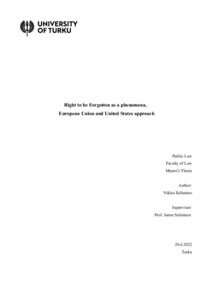Right to be Forgotten as a phenomena, European Union and United States approach
Ikäheimo, Niklas (2022-06-01)
Right to be Forgotten as a phenomena, European Union and United States approach
Ikäheimo, Niklas
(01.06.2022)
Julkaisu on tekijänoikeussäännösten alainen. Teosta voi lukea ja tulostaa henkilökohtaista käyttöä varten. Käyttö kaupallisiin tarkoituksiin on kielletty.
avoin
Julkaisun pysyvä osoite on:
https://urn.fi/URN:NBN:fi-fe2022080352663
https://urn.fi/URN:NBN:fi-fe2022080352663
Tiivistelmä
General Data Protection Regulation, known as Regulation (EU) 2016/679 of the European Parliament and of the Council, came to force on May 25, 2018. This regulation aims to modernize and harmonize EU legislation between EU's member states.
Right to be forgotten, in the Article 17 of the GDPR, is right granted to European citizens by the General Data Protection Regulation. This regulation forces companies that want to do business within the EU or with European Citizens to alter their data collection, processing and sharing. Right to be forgotten is a problematic right as it has many limitations, such as public's interest, scientific or historical research, or even statistical purposes.
United States of America, the US, has its own complex legislative system, where each of it's 50 states has their own legislation. Some of them are more strict, such as California with its ”Shine the Light” privacy law and some less strict, such as Wyoming with almost no privacy laws, when it comes to privacy laws, such as GDPR is for the EU.
The sanctions and laws vary in the US between each state, and there is nearly no harmonization on the Federal level, meaning that each state decides on their own how they want to deal with certain areas of law.
Sanctions that a company or organization will receive for failing to fullfil the requirements of the GDPR can reach up to many million Euros. This amount varies on how severe the infringement has been, and on how big the company at hand is.
Each European member state has had to create their own supervisory authorities to monitor the compliance of companies and organizations and to deal with claims and requests by individuals relating to the GDPR.
Biggest issues of the Right to be forgotten are its limitations and the speed on which information travels these days, also including the fact that when something is put on the internet, it will never be totally removed ever again as someone somewhere might have saved it.
On the US soil, the biggest issue is the non-harmonization of legislation, where basically every state can be seen as individual, and even if companies do obey one states legislation they can be breaking another states legislation at the same time.
The future challenges of the GDPR include the rapid technological development and possible legislation from outside the EU, which may tremple the GDPRs territorial scope.
Right to be forgotten, in the Article 17 of the GDPR, is right granted to European citizens by the General Data Protection Regulation. This regulation forces companies that want to do business within the EU or with European Citizens to alter their data collection, processing and sharing. Right to be forgotten is a problematic right as it has many limitations, such as public's interest, scientific or historical research, or even statistical purposes.
United States of America, the US, has its own complex legislative system, where each of it's 50 states has their own legislation. Some of them are more strict, such as California with its ”Shine the Light” privacy law and some less strict, such as Wyoming with almost no privacy laws, when it comes to privacy laws, such as GDPR is for the EU.
The sanctions and laws vary in the US between each state, and there is nearly no harmonization on the Federal level, meaning that each state decides on their own how they want to deal with certain areas of law.
Sanctions that a company or organization will receive for failing to fullfil the requirements of the GDPR can reach up to many million Euros. This amount varies on how severe the infringement has been, and on how big the company at hand is.
Each European member state has had to create their own supervisory authorities to monitor the compliance of companies and organizations and to deal with claims and requests by individuals relating to the GDPR.
Biggest issues of the Right to be forgotten are its limitations and the speed on which information travels these days, also including the fact that when something is put on the internet, it will never be totally removed ever again as someone somewhere might have saved it.
On the US soil, the biggest issue is the non-harmonization of legislation, where basically every state can be seen as individual, and even if companies do obey one states legislation they can be breaking another states legislation at the same time.
The future challenges of the GDPR include the rapid technological development and possible legislation from outside the EU, which may tremple the GDPRs territorial scope.
